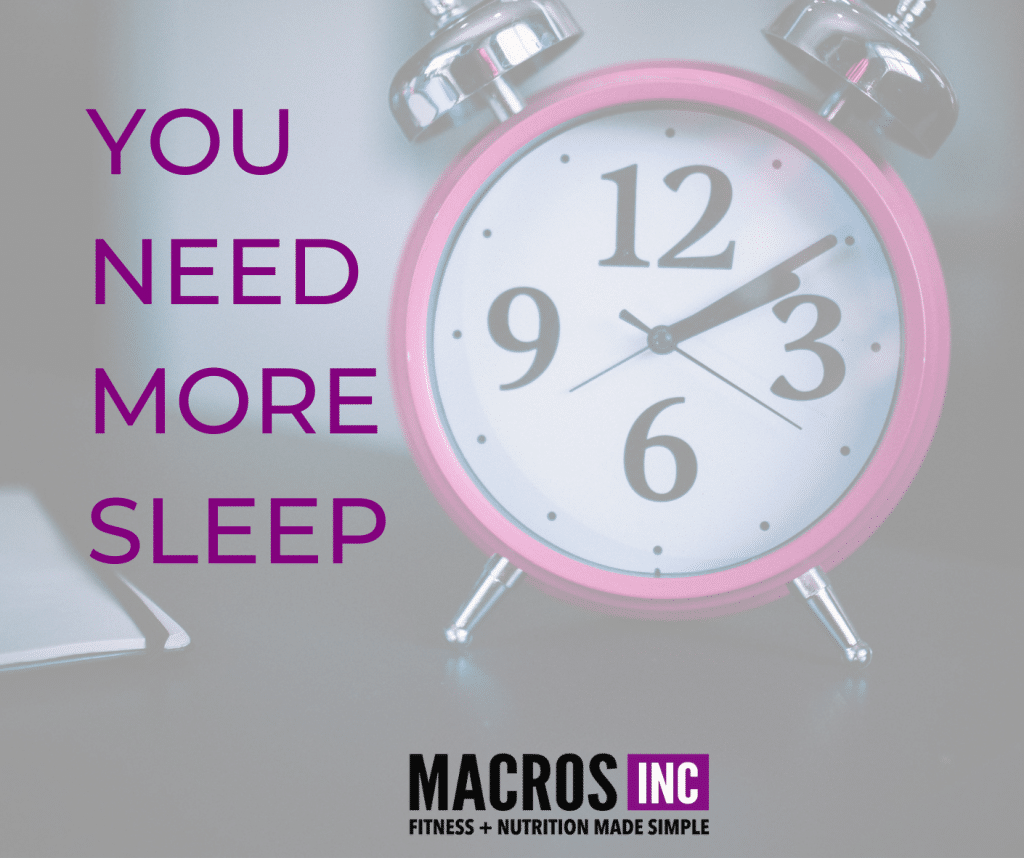By: Calvin Huynh | Macros Inc. Coach
Sleep is an interesting phenomenon isn’t it? You close our eyes, everything becomes nothing, and then you suddenly wake up… and then the same process repeats itself every night.
Most adults desperately want more, yet often refuse to prioritize it. You sacrifice on hours of it to stay up watching another Netflix episode or getting caught in the endless vortex that is YouTube.
You wake up the next morning, feeling like garbage. You think giving your already caffeine saturated body more coffee will help, but it is a temporary bandage at best. This cycle repeats and you wonder why you chronically lack energy, get cranky, and lose your self-control throughout the day.
If it was not obvious enough, you seriously need to stop overlooking sleep.
It’s ruining your life and impacting your fitness. No really, let me put things into perspective.
Jump to a Topic
You Are More Sleep Deprived Than You Think
People like comparing themselves to extremes.
“Well, at least I’m not as bad as this one friend who only sleeps a couple hours sometimes.”
Unfortunately, when it comes to what research tells us, you might be more sleep deprived than you think. One study looked at 14 days of 4, 6, and 8 hours per night (1). They compared brain, nerve, and physical function to the effects of 48 hours of complete sleep deprivation.
The researchers found that anything equal to or less than 6 hours of sleep per night had the same functional deficits as 2 straight days of no sleep. This study was also done in healthy adults, so expect these effects to be worse if your health is not optimal or if you have been sleep deprived for longer.
Body Composition
Sleep directly and indirectly impacts your body composition (muscle/fat mass) in many ways. Being sleep deprived slows down fat loss even if you catch up that sleep on the weekends (2). Losing more than a couple of hour can even cause muscle loss and reduce energy expenditure (3).
In fact, there is research showing simply fixing your sleep for a year, improves hormonal levels, increases muscle, and reduces fat mass all without any exercise (4).
Practically speaking, you will still be exercising, but have you ever had workout after a bad night or bad week of sleepless nights? It sucks huh?
Research finds a night of inadequate sleep does not impact performance too much, but multiple nights will be a bigger problem (5). This is why you should still workout even after a night of tossing and turning, but stress from life and training will eventually catch up to you if you allow for weeks of sleepless nights. After all, it is your body’s primary way to recover.
As cheesy as it sounds, sleep is the reset button you need to take full advantage of daily.
Effects on your Diet
Sleep can have pretty major effects on your eating behaviors and patterns.
People often describe being sleep deprived as like being a zombie, but a more accurate description may be a demon. Your patience is thin, you’re irritable, and will be making decisions with little self control.
Indeed, a recent review of studies found inadequate rest causes higher appetite, cravings, and caloric intake (8).
Being sleep deprived increases your stress and increased stress makes it harder to fall asleep (6,7). A vicious cycle that explains why sleep deprivation makes it so easy to neglect our diets and drown your face into a basket of cookies.
How To Get Better Sleep
For many of us, sleep is one of the missing components in our life. It enhances everything when you get 7-8 hours consistently, but any less than that, it starts to compound against you by compromising your health and fitness.
So here are some tips to take back your sleep schedule.
- Have a consistent slumber and wake time.
- Go to bed in a pitch dark and cool room. Think cave-like environments.
- Try not to go to bed hungry or dehydrated, but be careful drinking lots of water too close before bed because you might have to pee in the middle of the night.
- Maximize sunlight exposure early in the day and minimize blue light exposure from screens at the hours prior to bed.
- Include exercising as part of your lifestyle.
- Invest in a good mattress and pillows.
- Go to bed undistracted, unstressed, and relaxed.
- Leave your phone outside of your bedroom.
- Don’t consume caffeine after 2 pm.
- Take melatonin if needed.
Keep optimizing your environment and habits until you get 7-8 hours of consistent deep sleep where you wake up refreshed.
Try our nutrition coaching, for free!
Be the next success story. Over 30,000 have trusted Macros Inc to transform their health.
Simply fill out the form below to start your 14-day risk-free journey. Let's achieve your goals together!


